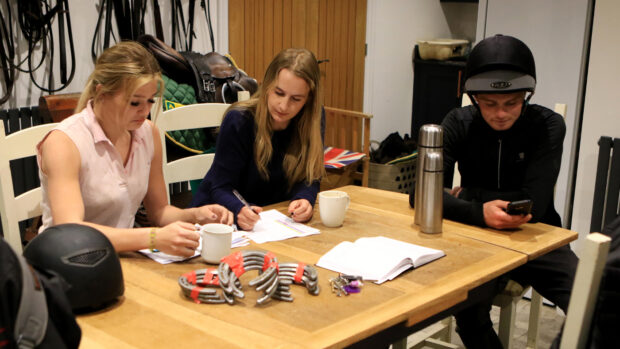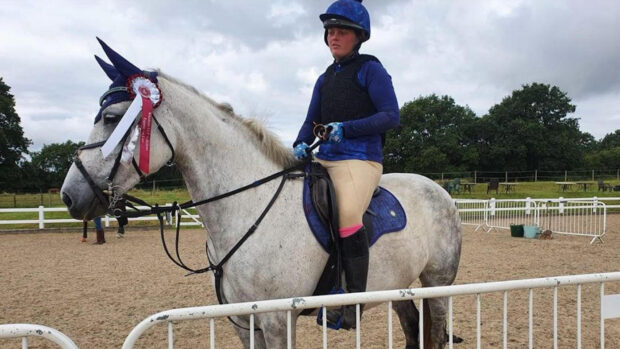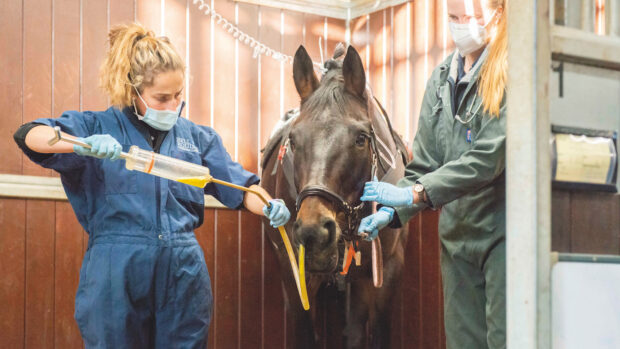Of all the support staff working with our Olympic riders in Athens this month, Jenny Hall, vet to the British eventing team since 1999, has had one of the toughest jobs.
She was pivotal in the sad decision to substitute Mary King for Sarah Cutteridge, whose mare, The Wexford Lady, sustained a small foreleg injury while schooling and was on hand when it became clear there was something wrong with Tamarillo after the cross-country.
From a background in farming, Hall qualified as a vet at Liverpool University. She then did some postgraduate work in Ohio and is now a partner of Hall and Lawrence, an all-woman veterinary practice in the jump racing heartland of Lambourn.
Hall’s phenomenally busy schedule involves attending most three-day events where British team members are riding, whether they are official team championships or not, and she scarcely broke her stride when she had a daughter, Aoife, earlier this year.
“You have a very good opportunity to hear the horses’ wind after the chase at a three-day event,” explains Jenny, “and getting to know each one’s connections in the heat of competition makes for good bridge-building. Seeing the trot-up is really useful too.”
There is something refreshingly pragmatic about Hall’s attitude to equine injuries and no doubt this, too, has something to do with her racing experience. She knows that if you run a horse at the peak of its abilities it is going to have some effect in the end.
“Superficial flexor tendon strains, soft tissue problems, suspensory branches — horses do suffer from wear and tear eventually. They may have to take a break in their career sometimes, but it’s not necessarily over if something happens,” she says.
“That said, not many of our horses in Athens have ever had a lot wrong with them,” she adds. “Having done this job for five years now, I know a lot about them and how sound they are.”
Jenny takes pains to liaise closely with riders’ vets at home and builds a detailed picture of each horse’s condition through regular monitoring: team training camps involve trot-ups, lunging sessions on hard surfaces and limb palpation by Jenny, as well as training under saddle.
Besides conferring with vets and riders, Jenny also fields enquiries forwarded from British Eventing (usually of the “am I OK to compete on such-and-such medication?” variety), accompanies horses on flights overseas and liaises regularly with each horse’s farrier.
“It’s very much a GP’s job really. You can be dealing with anything from a little scratch, a tight nail, a rub sustained while travelling — or advising where to send a horse on to if there’s a major injury.”
Although Hall makes no bones about the “pretty dramatic” radiant heat in Athens, the test event last year (which freakishly took place in temperatures cooler than those we were experiencing in Britain at that time) gave her no great cause for concern. The British horses all jumped the last fence really well, and had their heart rates monitored and blood tested at the event.
“But they were blowing more like racehorses than eventers,” adds Hall, “and their heart rates were higher than they’d be at Badminton or Burghley. They each had electrolytes and a probiotic paste, but nothing needed intravenous help. It did make me realise what an effect the heat can have, though.”
Much has changed in the sport during Hall’s involvement as team vet, not least the number of four-star runs top horses are given.
“Selectors’ views have changed and they don’t expect to see a horse do two four-stars a year any more,” she says. “Riders are allowed to run them less. It may not be a lot of fun for the owners, but if the ground’s hard it does create injuries — it’s not rocket science.”
Now she would like to see the expertise of the seniors filtering faster through the system.
“I think there’s a huge role to be done educating World Class Start and Potential riders about good shoeing and so on. It’s not an accident when horses stay sound.”
But this week, Hall’s concentration has been focused entirely on the British eventers’ quest for medals.
“The extra expense in coming as early as we did was well worth it. Our horses couldn’t have been fitter or better prepared,” she said.
|
||
 |
||

 Get up to 19 issues FREE
Get up to 19 issues FREE TO SUBSCRIBE
TO SUBSCRIBE 



